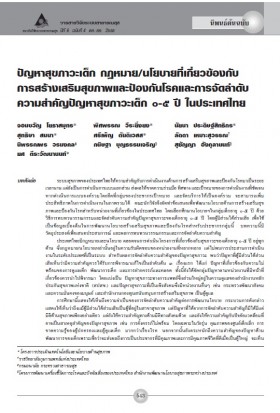This website uses cookies so that we can provide you with the best user experience possible. Cookie information is stored in your browser and performs functions such as recognising you when you return to our website and helping our team to understand which sections of the website you find most interesting and useful.
ปัญหาสุขภาวะเด็ก กฎหมาย/นโยบายที่เกี่ยวข้องกับการสร้างเสริมสุขภาพและป้องกันโรคและการจัดลำดับความสำคัญปัญหาสุขภาวะเด็ก 0-5 ปี ในประเทศไทย (2555)

รายละเอียดเพิ่มเติม
Abstract
Health promotion and disease prevention (PP) policy has played a critical role in the Thai health care system for a period of time. However, the implementations of such policies were still fragmented without a clear strategic plan and goals. The development of PP policy focusing on certain age group in a systematic manner was expected to help tackle those barriers. Children aged 0-5 group was selected as a pilot group for the development of PP policy recommendations for relevant PP agencies in Thailand. Extensive document reviews and deliberative process which involved the participation of stakeholders was employed in the health problems prioritisation process. This article aimed to share experiences and findings from the review and prioritisation process.
Child health related policy and law were completely available in Thailand and covered almost all aspects of health determinants. Those policy and law were under responsible of varied agencies; however, a well-coordinate initiative at a national level was not observed. According to the prioritisation process, three health related problems that stakeholders expressed as high priority were problems related to carers, child development, and antenatal care. The identified problems were also categorised according to type of problems and responsible agencies. Problems related to physical and mental health were mostly taken care by the National Health Security Office (NHSO), meanwhile problems concerning health and well-beings were under other agencies, i.e. the Ministry of Social Development and Human Security and the Thai Health Promotion Foundation.
Experiences from this study affirmed the importance of priority setting for policy development process. Although most of the stakeholders of the priority setting process were from health sector, prioritised problems were not solely focused on physical health. Proposed problems also included other societal aspects as well as environmental factors that might affect well-beings, e.g. teenage pregnancy, quality of child development centres, lack of parental knowledge of carers. In addition, the stakeholders also aware of an importance of child development as this would affect quality of the population and their quality of life in the future. Obviously, these social and well-being concerns have never been included in the benefit package for health promotion and disease prevention under the NHSO. Challenges included identification of effective interventions to tackle those prioritised problems in order to develop decent policy recommendations for the NHSO and other responsible agencies.




